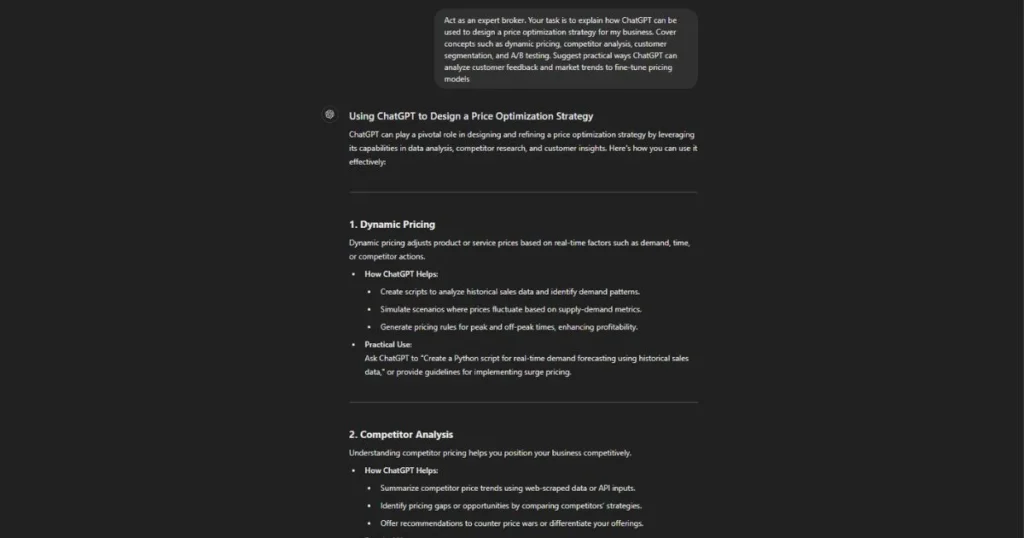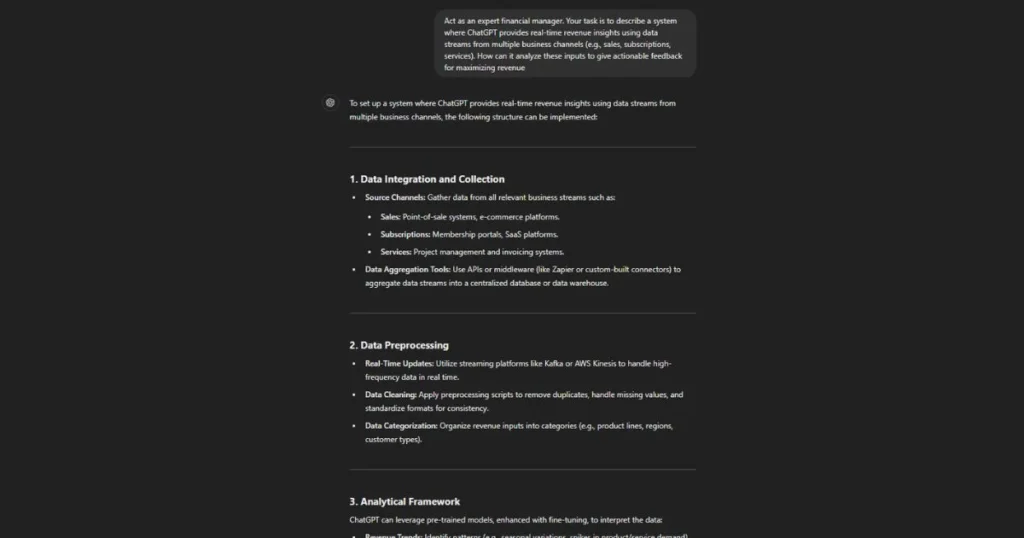A conversational AI tool called ChatGPT streamlines processes, offers insights, and improves revenue management decision-making. It analyzes data, answers consumer questions, and helps teams manage pricing strategies and demand predictions through the use of natural language processing. ChatGPT simplifies and speeds up complicated procedures in revenue management, where data-driven choices are crucial. For example, it can immediately respond to a large number of consumer questions, recommend price changes based on real-time analytics, and clearly explain trends.
Today we’ll examine the advantages, difficulties, and potential paths of this fascinating topic as ChatGPT for revenue management.
Table of Contents
- 1 The Evolution of ChatGPT in Revenue Management
- 2 Why AI and ChatGPT are game changer for business
- 3 Role of AI in Revenue Management Today
- 4 Challenges and Ethical Consideration
- 5 Practical Application of ChatGPT in Revenue Management
- 6 Revenue management in the future with CHATGPT and AI
- 7 ChatGPT Prompts for Revenue management
- 8 Conclusion
- 9 FAQ’s
The Evolution of ChatGPT in Revenue Management
As ChatGPT has gotten more intelligent and practical over time, it has developed into a powerful instrument for revenue management. Initially, it was primarily a chatbot for simple dialogues. It can now analyze data, offer insights, and even assist companies in making better decisions.
Businesses utilize ChatGPT, for example, to respond to consumer inquiries, offer pricing recommendations, or provide straightforward explanations of complicated revenue trends. ChatGPT to write a business plan helps to increase productivity and upcoming development, saves time, and increases earnings.
Why AI and ChatGPT are game changer for business
Because AI and ChatGPT provide data processing with human-like conversation, the combination is revolutionary. AI analyzes broad amounts of data, finds patterns, and predicts trends more quickly than humans.
However, through straightforward dialogues, ChatGPT simplifies this data and transforms it into useful insights. Better personalization, quicker client responses, and more informed decisions are what this means for organizations. Imagine ChatGPT helping customers purchase tickets or locate the best bargains in real time, while an airline uses AI to forecast peak travel periods. Working as a team increases productivity, enhances client satisfaction, and eventually increases sales.
Role of AI in Revenue Management Today
Today, artificial intelligence (AI) is essential to revenue management because it can analyze data, forecast trends, and assist companies in making better decisions. It swiftly converts vast volumes of data, such as pricing trends, market demand, and consumer behavior, into insightful knowledge. For example, AI is used by hotels to instantly modify room rates in response to demand or regional events. AI is used by retailers to forecast which products will sell better during particular times of the year. AI increases accuracy, saves time, and helps organizations increase income by automating key processes.
ChatGPT for revenue management helps to manage the business and simplify complex data. ChatGPT for risk management can provide pricing strategies, crisis management, and trend summaries. This keeps teams from becoming bogged down by numbers and enables them to make rapid, wise judgments.
Challenges and Ethical Consideration
- Data privacy and security considerations
Businesses now gather and examine more consumer data than ever before due to the growth of AI and machine learning in revenue management. This includes the obligation to guarantee the security of client data.
- Ethical pricing concerns
The possibility of unethical price manipulation is one of the possible risks associated with AI and dynamic pricing. For example, artificial intelligence (AI) algorithms have the ability to instantly modify prices in response to supply and demand, but they can also result in circumstances where customers are charged excessive rates during periods of strong demand, sometimes in ways that seem exploitative.
Practical Application of ChatGPT in Revenue Management
- Customer Communication. Using AI solutions like ChatGPT to promptly handle routine inquiries and reservation requests is the goal of automating customer interactions. Customers receive prompt, precise responses to questions about availability, booking information, and hotel services rather than having to wait for a human to answer.
- Dynamic pricing strategies. The main idea behind dynamic pricing is to instantly modify prices in response to market conditions. This procedure can be made quicker and more intelligent with ChatGPT for revenue management. It calculates real-time market data, such as rival price or demand, and makes immediate adjustment recommendations. Teams won’t have to spend hours looking through data to make well-informed judgments.
- Forecasting Demand. For firms to make effective plans, demand forecasting is very important. This can be facilitated by ChatGPT, which analyzes complex data and presents it in an understandable manner. Teams can use ChatGPT to ask queries like “What are the peak sales hours this week?” or “How is customer demand looking for next month?”
- Team collaboration. An intelligent virtual assistant like ChatGPT can help to promote and enhance collaboration. ChatGPT can swiftly collect, compile, and understandably display income data rather than requiring everyone to strain through numerous reports or systems.
Revenue management in the future with CHATGPT and AI
With ChatGPT and AI at the forefront, revenue management appears to have a brighter future. These tools will be used more widely by businesses, allowing for greater customization and intelligent automation.
Deeper customization entails providing them with precisely what they require. AI can, for example, use historical purchase data to recommend customized deals, giving each contact a different vibe. Repetitive chores, such as responding to questions or modifying prices, will be handled more quickly by intelligent automation. Teams may now concentrate on strategy and innovation.
More companies, both large and small, will begin utilizing these technologies as they become more widely available. This shows that by utilizing AI-powered insights, even tiny hotels or local businesses may compete with bigger enterprises.
ChatGPT and AI are more than simply tools; they are influencing how companies expand and change in a world that is changing quickly. With the advancement in AI, even financial advisors make smarter decisions, save time, and remain in front of market changes
ChatGPT Prompts for Revenue management
- Prompt to pricing optimization techniques
“Act as an expert broker with years of experience in this field. Your task is to explain how ChatGPT can be used to design a price optimization strategy for my business. Cover concepts such as dynamic pricing, competitor analysis, customer segmentation, and A/B testing. Suggest practical ways ChatGPT can analyze customer feedback and market trends to fine-tune pricing models.”

- Prompt for scenario planning and Risk management
“Act as an expert in revenue management. Your task is to guide me on using ChatGPT for scenario planning in revenue management. Include how it can simulate revenue impacts of various market conditions, such as economic downturns, competitive threats, or regulatory changes.”
- Prompt for Real-time revenue insight
“Act as an expert financial manager. Your task is to describe a system where ChatGPT provides real-time revenue insights using data streams from multiple business channels (e.g., sales, subscriptions, services). How can it analyze these inputs to give actionable feedback for maximizing revenue?

Conclusion
By streamlining data, increasing productivity, and providing individualized customer experiences, AI and ChatGPT are revolutionizing revenue management. These tools are becoming vital partners for companies looking to expand, from predicting demand and modifying prices to automating answers and facilitating teamwork.
FAQ’s
Through data analysis, task automation, and real-time insights, ChatGPT helps with revenue management. It facilitates dynamic pricing decisions, streamlines complicated patterns, and improves customer interactions with tailored answers.
Of course! Any size company can benefit from ChatGPT’s scalability. Without a big staff, small firms can utilize technology to increase productivity, automate repetitive operations, and make data-driven choices.
ChatGPT can recommend changes by analyzing real-time market data, including changes in demand and rival prices. To maximize income potential, it assists firms in real-time price optimization.








